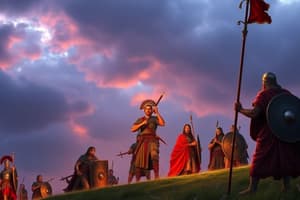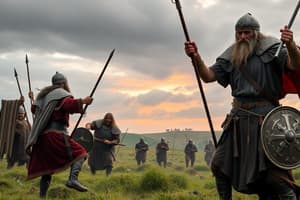Podcast
Questions and Answers
Which Germanic tribes invaded England in 449?
Which Germanic tribes invaded England in 449?
The Saxons were known for their literacy and education.
The Saxons were known for their literacy and education.
False
What is the significance of Bede's work in English history?
What is the significance of Bede's work in English history?
It was the first history of the English people.
The term used to describe the informal advisory council to the king is called the ______.
The term used to describe the informal advisory council to the king is called the ______.
Signup and view all the answers
Match the following place-names with their meanings:
Match the following place-names with their meanings:
Signup and view all the answers
What was the role of the shire reeve in the king's administration?
What was the role of the shire reeve in the king's administration?
Signup and view all the answers
The manorial system was established before the Normans.
The manorial system was established before the Normans.
Signup and view all the answers
Who was sent by Pope Gregory the Great to re-establish Christianity in England?
Who was sent by Pope Gregory the Great to re-establish Christianity in England?
Signup and view all the answers
The three types of agricultural fields were spring crops, autumn crops, and land left to __________ for a year.
The three types of agricultural fields were spring crops, autumn crops, and land left to __________ for a year.
Signup and view all the answers
Match the following titles with their roles in the feudal society:
Match the following titles with their roles in the feudal society:
Signup and view all the answers
What event is associated with William the Conqueror on December 25th?
What event is associated with William the Conqueror on December 25th?
Signup and view all the answers
Beowulf is considered the longest and oldest surviving poem of the Anglo-Saxon period.
Beowulf is considered the longest and oldest surviving poem of the Anglo-Saxon period.
Signup and view all the answers
Who is the national hero of the Geats in the epic poem Beowulf?
Who is the national hero of the Geats in the epic poem Beowulf?
Signup and view all the answers
The battles in Beowulf primarily take place against the monster Grendel and its ______.
The battles in Beowulf primarily take place against the monster Grendel and its ______.
Signup and view all the answers
Match the following literary terms with their descriptions:
Match the following literary terms with their descriptions:
Signup and view all the answers
What role did Saxon kings play in the growth of the Church?
What role did Saxon kings play in the growth of the Church?
Signup and view all the answers
King Alfred was defeated by the Vikings in 878.
King Alfred was defeated by the Vikings in 878.
Signup and view all the answers
What term refers to the eastern and northern parts of England controlled by the Danes?
What term refers to the eastern and northern parts of England controlled by the Danes?
Signup and view all the answers
The archbishop of Canterbury was a center of __________ power across England.
The archbishop of Canterbury was a center of __________ power across England.
Signup and view all the answers
Match the following leaders with their significance:
Match the following leaders with their significance:
Signup and view all the answers
What was the significance of monastic establishments such as Westminster?
What was the significance of monastic establishments such as Westminster?
Signup and view all the answers
Celtic bishops played a significant role in teaching Christianity.
Celtic bishops played a significant role in teaching Christianity.
Signup and view all the answers
Who was the immediate heir of Edward the Confessor?
Who was the immediate heir of Edward the Confessor?
Signup and view all the answers
Study Notes
The Saxon Invasion
- The Saxon invasion involved three Germanic tribes: Angles, Saxons, and Jutes.
- The invasion began in 449 AD.
- These groups settled parts of Britain, pushing earlier inhabitants out.
- Areas occupied by these settlers are shown on a map.
- Bede's Ecclesiastical History of the English People is the earliest known history of the English people.
- It was written in 730.
- Place names in some regions, and names of rivers like the Thames, Mersey, Severn, and Avon, and cities such as London and Leeds, have a Celtic origin.
- Days of the week are named after Germanic Gods.
- Examples of place names include Birmingham, Nottingham, Southampton and Kingston.
- Key kingdoms included Northumbria, Mercia, Wessex, Essex, Sussex, Middlesex and East Anglia.
- The concept of kingship differed between the Celts and Saxons.
- Celtic tradition prioritised family ties, whereas Saxon tradition prioritized the king and lord.
- The largest three kingdoms were Northumbria, Mercia and Wessex.
Anglo-Saxon Government and Society
- The manor system, a key feature of society, emerged under the Normans.
- Manors were simple buildings where villagers paid taxes and joined the Anglo-Saxon army.
- Local administrators and officers including aldermen, and earls were important in local government.
- The system led to the creation of social classes: kings, lords, soldiers and peasants.
- Clergy of the Christian church also held a significant role.
Anglo-Saxon Christianity
- Christianity spread across Britain through Roman government support.
- The Anglo-Saxons had their own beliefs but adopted their new religion.
- Paganism still existed.
- Place-names containing "llan" show the sites of Celtic monasteries in Wales.
- Augustine, appointed by Pope Gregory the Great in 597, was sent to re-establish Christianity in England.
- He became the Archbishop of Canterbury.
- The courts of the kings were central to Church power in England.
- Celtic bishops taught aspects of Christianity.
Christianity and the State (Continued)
- Saxon kings' power grew along with the church.
- Kings gained legitimacy through the support of the church which was seen as a sign of God's approval.
- Monasteries were established, becoming centres of learning and education.
- The influence of the church increased the kings' authority.
- The authority and influence of the church increased.
- King Alfred the Great's contributions to translation fostered literacy and learning.
The Vikings
- By the 8th century, Vikings from Norway and Denmark raided Britain, burning churches and monasteries.
- Christianity slowly became more widespread among the Vikings.
- King Alfred the Great triumphed in a decisive battle versus these raiders c. 878; this led to the establishment of 'Danelaw'.
- 'Danelaw' comprised the eastern and north of England.
- Settlements in the 'Danelaw' became prosperous market towns known as 'boroughs'.
Who Should Be King?
- The succession to the throne of England during this period was often disputed.
- The Witan, a council of advisors, played a crucial role in choosing the monarch.
- Edward the Confessor, who was chosen by the Witan had less emphasis on secular power and more focus on Church matters.
- Harold II was chosen by the Witan but had no royal blood.
- Eventually William the Conqueror, who ultimately won the Battle of Hastings in 1066 was crowned King of England.
Beowulf (1000)
- Beowulf is an anonymous old English epic poem, written in West Saxon dialect.
- It recounts the adventures of a national hero of the Geats.
- The poem is set during the 5th and 6th centuries.
- Beowulf's adventures include killing Grendel and other monsters.
- He also fights a dragon, although he and his men suffer losses.
- Themes include loyalty to the lord, supernatural battles, and strength.
Studying That Suits You
Use AI to generate personalized quizzes and flashcards to suit your learning preferences.
Related Documents
Description
Explore the pivotal Saxon invasion of Britain by the Angles, Saxons, and Jutes in 449 AD. This quiz delves into the impact of these Germanic tribes on the British Isles, including place names, cultural influences, and the evolution of kingship. Understand how these events shaped early English history as documented by Bede.




